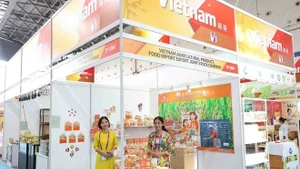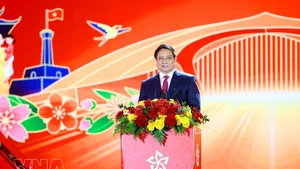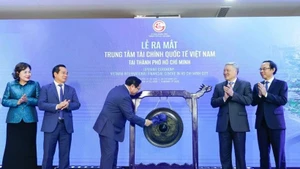In the context that many countries have announced specific roadmaps to apply the global minimum tax from the end of this year, foreign direct investment (FDI) enterprises in Vietnam expressed their hope that Vietnam will soon release an official message on this matter.
Recommendations from investors
The impact of the global minimum tax policy on Vietnam's investment environment is urgent, which is reflected in two aspects: taxing rights in Vietnam, and competitiveness in attracting foreign investment.
With the policy of using corporate income tax incentives as a financial leverage tool to influence investment trends, many large multinational companies investing in Vietnam are enjoying much lower tax rates than the average of 20%.
Therefore, when the global minimum tax of 15% is applied, the businesses subject to adjustment will no longer benefit because the difference is additionally collected in the investee country or in the country of their headquarters.
Hong Sun, Chairman of the Korean Business Association in Vietnam, said that when applying the global minimum tax, large enterprises from the Republic of Korea (RoK) that are investing in Vietnam will have to pay the reduced tax to the RoK.
Thus, Vietnam's preferential policies to attract foreign investment, especially investment capital from the RoK, will be nullified, reducing Vietnam's competitiveness in investment attraction. The problem became clearer when Kim Jin Seong, Deputy General Director in charge of finance of Samsung Vietnam, affirmed that the competitiveness of this business will decrease when the global minimum tax is implemented.
Samsung Vietnam proposed that the government apply an additional minimum domestic tax to keep taxing rights with multinational corporations while developing a new investment support mechanism for businesses investing in Vietnam. This would not only benefit Vietnam's tax revenue but also provide new investment incentives, increase competitiveness for businesses, and ensure benefits for both enterprises and the Government.
Deputy General Director of Canon Vietnam Limited Company Dao Thi Thu Huyen said one of the reasons for Canon’s investment for large-scale production in Vietnam is the policy of enjoying tax incentives.
With its current scale, Canon is subject to the global minimum tax. Therefore, if Vietnam does not implement timely countermeasures, it is likely that the Canon Group will consider allocating production to another location with more competitive advantages. At that time, not only Canon Vietnam but also more than 130 other satellite manufacturers will be affected.
However, Chief Representative of Japan External Trade Organisation (JETRO) in Hanoi Nakajima Takeo said that only about 24% of Japanese enterprises assessed that the tax incentives create the attractiveness for the business environment in Vietnam.
Tax is a matter of concern for businesses when they decide their investment, but not a decisive factor, because businesses also consider growth potential, investment environment, and market scale.
Therefore, it is necessary to optimise administrative procedures to reduce costs for businesses, which is just as important as tax incentives. Vice President of the European Chamber of Commerce in Vietnam (Eurocham) Tran Hai Minh also said that many member enterprises suggested that Vietnam should reconsider its preferential policies to attract FDI and not rely on tax incentives alone.
Vietnam has the advantages of geographical location, land, labour resources, and the openness of the economy with many free trade agreements, which can help businesses participate more conveniently in the global supply chain. They are very significant advantages that need to be improved for investment attraction.
Harmonising interests among parties
The time to apply the global minimum tax is approaching, requiring Vietnam to accelerate the process of researching policies and solutions when the Global Minimum Tax is widely implemented. The first messages on measures to respond to the global minimum tax have been sent by government agencies to investors and FDI enterprises.
Responding to businesses' questions about Vietnam's policies related to the global minimum tax raised at the annual Vietnam Business Forum (VBF) 2023, Deputy head of the General Department of Taxation Dang Ngoc Minh said that in the immediate future, the Ministry of Finance is expected to introduce a minimum tax rate of 15% for businesses and corporations affected by the minimum tax under the framework of the Organisation for Economic Cooperation and Development (OECD). The Ministry will then issue regulations on tax deducted at source in Vietnam.
Deputy Minister Nguyen Thi Bich Ngoc also said the global minimum tax application will have direct impacts on the investment environment and create new challenges in the process of attracting foreign investment in Vietnam and the investment from Vietnamese enterprises abroad in the near future.
Therefore, it is necessary to adjust investment attraction and preferential policies such that they are compatible with the global minimum tax and have the least impact on businesses, ensuring consistency in investment attraction and guarantee policies for investors in Vietnam.
In the near future, relevant ministries and agencies of Vietnam will report to competent authorities for the consideration of timely and appropriate application of measures to contribute to harmonising interests between the State and investors, preserving the stable image of Vietnam's investment environment, and encouraging investors to maintain and expand their investment activities and continue to attract key investment projects in line with the country's socio-economic development strategy in the new period.
















